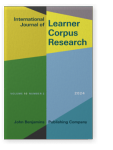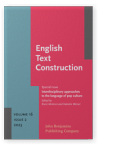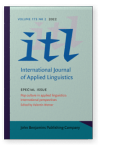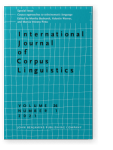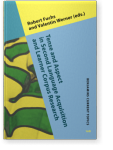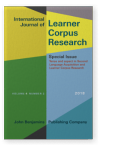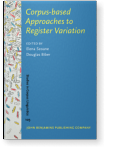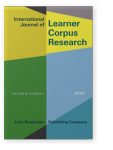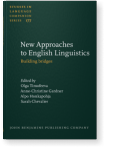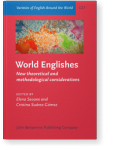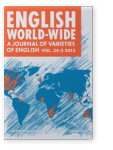Valentin Werner
List of John Benjamins publications for which Valentin Werner plays a role.
Journals
ISSN 2950-578X | E-ISSN 2950-5798
Interdisciplinary approaches to the language of pop culture
Edited by Rocío Montoro and Valentin Werner
Special issue of English Text Construction 16:2 (2023) v, 152 pp.
Subjects Applied linguistics | English linguistics | English literature & literary studies | Theoretical literature & literary studies
Pop culture in applied linguistics: International perspectives: Special issue of ITL - International Journal of Applied Linguistics 173:2 (2022)
Edited by Valentin Werner
Special issue of ITL - International Journal of Applied Linguistics 173:2 (2022) v, 158 pp.
Subjects Applied linguistics | Language acquisition | Language policy | Language teaching | Multilingualism
Corpus approaches to telecinematic language
Edited by Monika Bednarek, Valentin Werner and Marcia Veirano Pinto
Special issue of International Journal of Corpus Linguistics 26:1 (2021) v, 160 pp.
Subjects Computational & corpus linguistics
Tense and Aspect in Second Language Acquisition and Learner Corpus Research
Edited by Robert Fuchs and Valentin Werner
[Benjamins Current Topics, 108] 2020. v, 161 pp.
Subjects Corpus linguistics | Language acquisition | Multilingualism | Syntax | Theoretical linguistics
Tense and aspect in Second Language Acquisition and Learner Corpus Research
Edited by Robert Fuchs and Valentin Werner
Special issue of International Journal of Learner Corpus Research 4:2 (2018) v, 158 pp.
Subjects Applied linguistics | Corpus linguistics | Language acquisition | Language teaching
2023 Interdisciplinary approaches to the language of pop culture: Interdisciplinary approaches to the language of pop culture Interdisciplinary approaches to the language of pop culture, Montoro, Rocío and Valentin Werner (eds.), pp. 109–118 | Review article
2023 Mental health songs: Corpus-based analysis and implications for EFL education Interdisciplinary approaches to the language of pop culture, Montoro, Rocío and Valentin Werner (eds.), pp. 169–196 | Article
This study explores how mental health is represented and discussed in English-language pop song lyrics. To this end, a specialized corpus of mental health songs, understood as songs that explicitly mention or refer to issues related to mental health and resilience, is analyzed through a combined… read more
2022 Pop culture in applied linguistics: International perspectives Pop culture in applied linguistics: International perspectives: Special issue of ITL - International Journal of Applied Linguistics 173:2 (2022), Werner, Valentin (ed.), pp. 161–171 | Review article
2021 Corpus approaches to telecinematic language Corpus approaches to telecinematic language, Bednarek, Monika, Valentin Werner and Marcia Veirano Pinto (eds.), pp. 1–9 | Introduction
2021 Chapter 8. A register approach toward pop lyrics in EFL education Corpus-based Approaches to Register Variation, Seoane, Elena and Douglas Biber (eds.), pp. 209–234 | Chapter
The language-educational literature seems to agree on the conversational nature of pop lyrics. Thus, they have been advocated as an authentic, easily accessible and highly motivating resource for EFL learning, especially suitable to introduce conversational features. The present study re-assesses… read more
2021 A diachronic perspective on telecinematic language Corpus approaches to telecinematic language, Bednarek, Monika, Valentin Werner and Marcia Veirano Pinto (eds.), pp. 38–70 | Article
Previous corpus-based studies, which have mostly focused on a particular film or series, have identified various key characteristics of telecinematic language. However, a restriction on those results applies as regards the stability of findings across time and across individual productions. To… read more
2020 The use of stative progressives by school-age learners of English and the importance of the variable context: Myth vs. (corpus) reality Tense and Aspect in Second Language Acquisition and Learner Corpus Research, Fuchs, Robert and Valentin Werner (eds.), pp. 53–82 | Chapter
Previous studies indicate that even Advanced learners of English as a Foreign Language and speakers of English as a Second Language extend the progressive to stative verbs, contrary to the predictions of the Aspect Hypothesis (AH). We test this claim based on a corpus of beginning and lower… read more
2020 Tense and aspect in Second Language Acquisition and learner corpus research Tense and Aspect in Second Language Acquisition and Learner Corpus Research, Fuchs, Robert and Valentin Werner (eds.), pp. 1–21 | Chapter
2018 Tense and aspect in Second Language Acquisition and learner corpus research: Introduction to the special issue Tense and aspect in Second Language Acquisition and Learner Corpus Research, Fuchs, Robert and Valentin Werner (eds.), pp. 143–163 | Review article
2018 The use of stative progressives by school-age learners of English and the importance of the variable context: Myth vs. (corpus) reality Tense and aspect in Second Language Acquisition and Learner Corpus Research, Fuchs, Robert and Valentin Werner (eds.), pp. 195–224 | Article
Previous studies indicate that even advanced learners of English as a Foreign Language and speakers of English as a Second Language extend the progressive to stative verbs, contrary to the predictions of the Aspect Hypothesis (AH). We test this claim based on a corpus of beginning and lower… read more
2016 Patterns of linguistic globalization: Integrating typological profiles and questionnaire data New Approaches to English Linguistics: Building bridges, Timofeeva, Olga, Anne-Christine Gardner, Alpo Honkapohja and Sarah Chevalier (eds.), pp. 35–66 | Article
In this paper, we present ways of relating the broad scope of typologically motivated approaches to variationist questionnaire data. We explore how descriptive and inferential statistics (such as linear regression) and exploratory techniques (such as aggregative analyses) can be combined for a more… read more
2016 Overlap and divergence – aspects of the present perfect in World Englishes World Englishes: New theoretical and methodological considerations, Seoane, Elena and Cristina Suárez-Gómez (eds.), pp. 113–142 | Article
This study provides an analysis of the Present Perfect (PrPf; have + V-en) in World Englishes. To this end, I extract occurrences of the PrPf from the International Corpus of English and annotate them manually for various factors (such as semantics, Aktionsart, temporal adverbials). I analyze the… read more
2013 Temporal adverbials and the present perfect/past tense alternation English World-Wide 34:2, pp. 202–240 | Article
Specification by certain temporal adverbials has been shown to be one of the typical triggers of the present perfect in British English. Often, however, L2 varieties display different patterns of temporal co-occurrence, especially using the simple past tense. This study is based on corpus data from… read more
